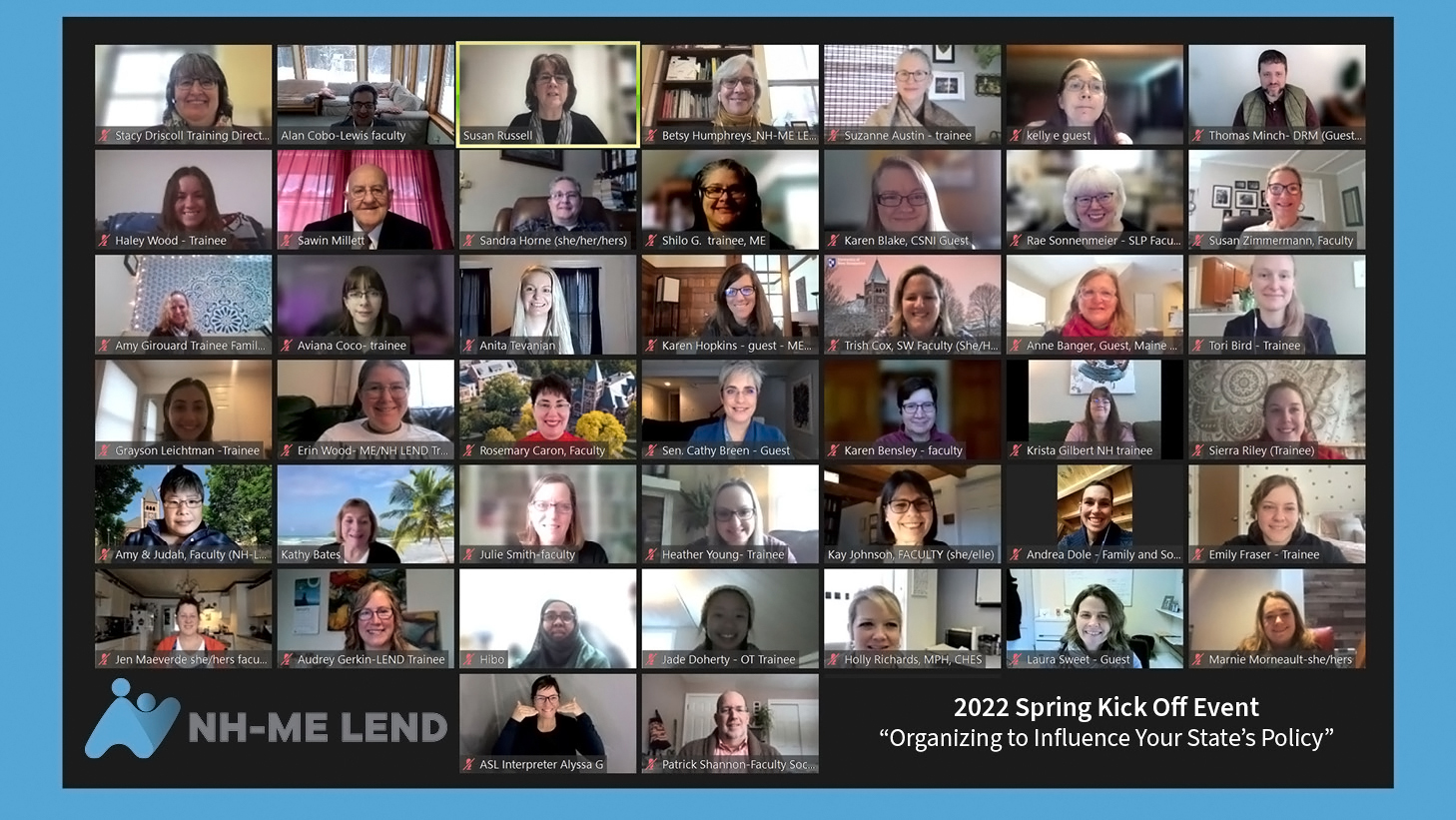
NH-ME LEND Spring Kick Off: Organizing to Influence State Policy
In late January, the New Hampshire-Maine Leadership Education in Neurodevelopmental Disabilities (NH-ME LEND) Program hosted a panel discussion and keynote speaker as part of their virtual Spring Kick Off Event, Organizing to Influence Your State’s Policy.
 The six panelists, two from NH and four from ME, represented a variety of perspectives on policy-making and generated some robust discussions about organizing and mobilizing, the influence of people with disabilities and family members on policy, building coalitions, educating legislators, and responding to failures and setbacks.
The six panelists, two from NH and four from ME, represented a variety of perspectives on policy-making and generated some robust discussions about organizing and mobilizing, the influence of people with disabilities and family members on policy, building coalitions, educating legislators, and responding to failures and setbacks.
“Policy work is really problem-solving; always trying to figure out where we can find agreement on what government’s job is,” said ME panelist Senator Catherine Breen (D-Cumberland). “When I boil down all of the different debates I’ve had over the years about policies or bills or budgets, they all come down to one thing: do people agree what the job of government is? That’s where you find the widest disparities and opportunity for agreement.”
The panel discussion and subsequent keynote by parent advocate Laura Sweet were designed to help prepare NH and ME trainees to participate in the annual Disability Policy Seminar (DPS) in Washington, DC later this spring. The DPS is a three-day federal legislative conference co-sponsored by seven national disability organizations and provides trainees with the opportunity to network, learn about disability policy, and meet with their congressional delegations.
Dr. Alan Cobo-Lewis, NH-ME LEND Program Co-Director and panel moderator noted, “My experience in general, is that people doing [policy] work do it because they want to make positive change, but they may not know what positive change looks like for our community.”
Karen Blake, a NH panelist and NH LEND Trainee (2012-2013) shared that during her time as a trainee, her young son was being restrained weekly, even daily. “That was the only tool in his school’s toolbox,” Blake said. LEND provided her with an opportunity to travel to Washington, DC and speak with members of her congressional delegation about restraint and seclusion. After completing the LEND program, Blake did some work nationally on the issue as a member of the NH Developmental Disabilities Council. She returned to the Disability Policy Seminar the following year as a panelist, speaking about her experiences and her son’s experiences with seclusion and restraint.
In her closing comments, Senator Breen encouraged trainees not to be deterred by failure: enacting meaningful policy change sometimes requires years of sustained attention. “If a bill fails this session,” said Breen, “build a coalition, build a group of people that includes all of the different stakeholders around that issue. You have research that backs up what you’re trying to do. You have experts in the field, who are not only national, but local. Models from other states or national expertise can go both ways, so you have to make sure you have some homegrown expertise and homegrown credibility.”
Caption for the tiled headshots: Top left: Cathy Breen–ME State Senator; Top right: Kelly Ehrhart–President of People First New Hampshire; Middle left: Karen Blake–Director of Public Policy and Advocacy/Community Support Network, Inc.; Middle right: Laura Sweet– parent advocate; Bottom left: Thomas Minch–Civil Rights Advocate, Deaf Services, Disability Rights Maine; Bottom right: Sawin Millett–ME State Representative.
Photo credit: Headshots of the panel courtesy of the panelists.
